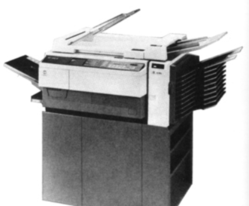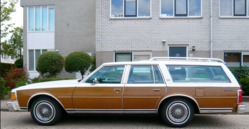I've been wanting to put this anthology together for a some months. Since I have a sales month where I can breath again I've found the time to put these together.
If you know any of these awesome sales people that sold copiers in the 70's shoot them a note or post a response on this blog for them. Now for Part II
Funniest Copier Moments
Chuck Parr One of my first sales was at a small law firm at 120 Wall St. by the East River. The Managing Partner told me all about their copier, which they weren’t happy with, in his heavy Brooklyn accent. He said it was “Copy-uh Two”, I’d been thru some good competitive product training ( there weren’t that many products to know back in 1975) I immediately knew it was the notorious roll-fed IBM Copier2. I was well versed about its pricing – generous limitless “Top Stop” Pricing where the customer did not pay a click charge for any volume over 40,000.
I diligently got the key info I needed like volume - how many rolls of paper they used - key documents etc. I prepared a very nice side-by-side comparison of the IBM 2 versus the just released Xerox 3100. Speeds and Feeds. Pricing and the “FABs” for the law firm and the inevitable monthly savings that every proposal always seemed to project. When I met with the Partner and walked him thru my proposal, I had included a picture of an IBM II that I had cut / pasted from SpecCheck (do they still publish that ?). The partner cut me off before I could go further and said - “let me show you our machine ”. He walked me back to the copy room and there stood his machine - an “Olivetti COPIA 200 “. I was flabbergasted and red faced. I didn’t even know that Olivetti made copiers. He actually laughed about it when I explained the mix-up. He allowed me to revise my proposal. Ultimately they rented a Xerox 4000 for much more $ than their Italian job. It was my biggest sale to date as a territory rep. You can read the rest of Chuck Parr Selling Copiers in the Seventies here
Ed Mclaughlin I remember one day when a particularly aggressive guy tailgating me over the Benjamin Franklin Bridge pulled up behind me at the toll gate within inches of my rear bumper became startled when as I pulled away from the toll booth, he right behind me, the door suddenly flipped open. The 250 LBS 3M “209” monster came screaming out of the back. It had an automatic document feed on it, and it hung just inched from the windshield of his beautiful new MGB sports car. I knew what the look of fear was that day. I jumped out, pushed the copier back in the car, jumped back in, and took off. The MGB took a few seconds to compose himself, and I noticed a safe distance between him and me as I traveled down the highway. You can read the rest of Ed Mclaughlin Selling Copiers in the Seventies here
Darrell Leven There are many but you would have to know the characters in the stories. Prospects used to get excited when you showed them that the big orange lever on the side of the Savin 770 Copier could switch paper size from 8 1/2 x 11 to 8 ½ x 14 ….. that was a big selling feature over the Xerox 3100….it only has one size cassette in the machine. You can read the rest of Darrell Leven Selling Copiers in the Seventies here
Rich Sissen We sold the Apeco 288. It was a liquid coated paper roll copier. We call it the “Jam o meter”. When jam on a demo, this happen often, you told the prospect. “ I am glad that happen, now I can show you how easy a jam is to clear You can read the rest of Rich Sissen Selling Copiers in the Seventies here
-=Good Selling=-
We'll be posting part III next week












 What was the percentage of copier sales people that made it past two years and why made them last or not last so long?
What was the percentage of copier sales people that made it past two years and why made them last or not last so long? 
 My car was a “Subway Car” and this is what a graffiti defaced subway car looked like during my time riding them in NYC. Pretty sad...I refer you back to Rudy and why they no longer look that way. Xerox machines in the 70s did not lend themselves to be carted around the streets. The logistics of NY downtown were difficult for sure. My “demos” were both ones done in our office demo room , which I might do 1- 2 a week on good weeks and the most effective demos were on site pre-qualified 30 day trials. At any given time I might have 3 or 4 on site demos. My Close rate on those were usually 1 in 4. I was just OK at best.
My car was a “Subway Car” and this is what a graffiti defaced subway car looked like during my time riding them in NYC. Pretty sad...I refer you back to Rudy and why they no longer look that way. Xerox machines in the 70s did not lend themselves to be carted around the streets. The logistics of NY downtown were difficult for sure. My “demos” were both ones done in our office demo room , which I might do 1- 2 a week on good weeks and the most effective demos were on site pre-qualified 30 day trials. At any given time I might have 3 or 4 on site demos. My Close rate on those were usually 1 in 4. I was just OK at best.
 .
.








